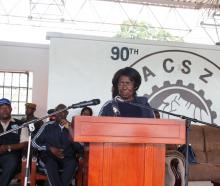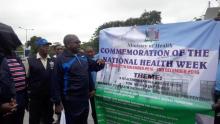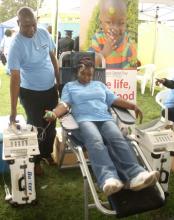Zambia launches the first ever National Health Week to stimulate a “Whole of Government and Whole of Society effort” in health promotion and tackling of Non-communicable diseases
Lusaka, 30 November 2016 – The Vice President of the Republic of Zambia, Her Honour, Mrs Inonge Mutukwa Wina officially launched the inaugural National Health Week in Zambia on 28 November in Lusaka. The function brought together government ministries and departments, United Nations Agencies, Non-Governmental Organizations, Community Based Organizations, research and academic institutions, private sector, academic institutions, the media and the general public.
The National Health Week 2016 was launched under the theme “A healthier Zambia begins with you, me and the family: “Hands up to health promotion and disease prevention”. The major objective of the week is to improve wellness and to prevent ill-health by stimulating individuals, families and communities to take responsibility for health and to strengthen partnerships. The initiative is designed to foster and entrench wellness and protection from communicable and non-communicable diseases, water borne and vaccine preventable diseases. This approach is in line with the Government’s vision of “A nation of healthy and productive people” using the key principles of Primary Health Care (PHC).
In her launch statement, the Vice President said Zambia was experiencing an increase in non- communicable diseases (NCDs) and that for many years communicable diseases such as HIV and AIDS, Malaria and Tuberculosis posed a challenges to the health systems while the country was also at risk of emerging diseases. She also stated that the abuse of alcohol and other substances by young people had the potential to ruin the future generation of the country.
The Vice President said that promoting health and preventing disease was important in growing the local communities and the country at large and that healthy communities were fundamental for economic growth and development. She therefore called for a “Whole of Government and Whole of Society Approach” in promoting health. “Promoting good health, preventing disease and entrenching wellness in our day to day lives should not be left entirely to health workers, clinics and hospitals. It is our collective responsibility to ensure that healthy lifestyles are adopted at all levels. I call upon government institutions, private sector, NGOs, civil society and service clubs to embrace the obligation and responsibility of wellness by encouraging individual, family and collective action”. She said. The Vice President also emphasized the importance of maintaining a clean and healthy environment as a sure way of preventing diseases.
Speaking on behalf of the United Nations in Zambia, the WHO Representative, Dr. Jacob Mufunda said that the UN family in Zambia embraced the national health week and applauded the timeliness of the intervention. He said that there were existing opportunities for the UN “Delivering as One” to support the fight against non-communicable diseases (NCDs) particularly through the joint Sustainable Development Goal Partnership Framework between the UN and Government, which is aligned with the Seventh National Development Plan 2017-2021.
Dr. Mufunda also said that the United Nations Inter-Agency Taskforce on Non Communicable diseases, (UNIATF) visit to Zambia from 5 - 9 December 2016 would provide the much required convergence of the efforts and interventions to prevent NCDs in Zambia. He further said that the first national survey of risk factors for NCDs in Zambia in 2016 would provide evidence for the revision of a national strategic plan on NCDs into a multi-sectoral plan with an implementation framework. Dr Mufunda concluded by highlighting the movement towards the practice of Health in all Policies in Zambia to make all ministries and sectors aware of the need to consider health in their policies as another opportunity for promoting health and tackling NCDs.
The Minister for Lusaka Province, Hon. Japhen Mwakalombe stated that he was pleased that Lusaka province was hosting the launch of the National Health Week 2016 because the province had a high burden of disease. He emphasized the need for communication of information on disease prevention to the community and encouraged everyone to access the services which are being provided. He underscored that ignorance should not be an excuse for not preventing disease particularly at individual and family levels.
During this inaugural health week different target audiences have been deliberately identified to receive information and health services in order to address needs for specific groups including those who are hard to reach, women, youth, the aged and for specific settings such as schools, prisons, workplaces and communities at large. The activities conducted include among others, information dissemination through the media, provision of health services at health facilities through the mobile hospitals and in the community particularly health checks for cancer, blood pressure, cholesterol levels, dental and vision, diabetes and HIV testing. Other activities include: nutrition and counselling, blood donation, improving environmental sanitation and promotion of hand washing, distribution of condoms, male circumcision, public information displays, sports activities, demonstration of health and emergency preparedness activities, mental health, and information on prevention of smoking and alcohol abuse as well as public health inspections in targeted places.
A specific theme has been identified for each day of the week as follows:-
Day 1: Healthy diets and lifestyle;
Day 2: Screening for Cancers (breast, cervical and prostate);
Day 3: Malaria;
Day 4: HIV/ TB/ STI activities including male circumcision;
Day 5: Communicable diseases and Environmental health and
Day 6: Safe motherhood, Family planning and child health
Zambia like many other countries in the African Region faces a high burden of communicable diseases and a growing burden of non-communicable diseases. The national HIV prevalence is 13.3% while the TB prevalence is 638 cases per 100,000 in the adult population, ranking Zambia one of the thirty high TB burden countries. Malaria remains endemic throughout the country with 336 cases per 1000 population in 2015. The country is also prone to outbreaks of cholera, dysentery, measles, meningitis, anthrax and plague. Tobacco use, alcohol misuse and use of other psychoactive substances is a major concern in the country. Zambia is facing an increase in the number of road traffic accidents, putting the health care system under pressure to provide quality care for the victims. The Maternal Mortality Rate in Zambia is high at 398 per 100,000 live births (ZDHS, 2013-2014) while the Under-Five Mortality rate is 64 per 1000 live births. Malnutrition also poses a threat to child health and survival with the prevalence of stunting in Zambia currently 40%.
The launch of the National Health Week 2016 is in line with the Sustainable Development Goal number 3 on health which calls for “ensuring healthy lives and promotion of well-being for all ages”. It provides an opportunity to improve the provision of quality health services and realizing the 2030 target of making Zambia a medium-income country of healthy and productive people, where no one is supposed to be left behind.
_______________________________
For more information contact:
Nora Mweemba, Health Promotion Officer
WHO country Office, Zambia
mweemban [at] who.int
+260 211 255322
_______________________________
01 The Vice President, seniour government officials and the general public joined in aerobics activities to signify the importance of physical activity to health
02 Minister of Health, Hon. Chitalu Chilufya, flagged off the National Health Week march in the company of the WHO Representative, Dr. Jacob Mufunda and seniour goverment officials at Manda Hill Shopping complex in Lusaka
03 A lady donating blood at the Zambia National Blood Transfusion Services stand during the launch of the National Health Week in Lusaka
04 The Vice President of the Republic of Zambia, Her Honour, Mrs Inonge Mutukwa Wina, launching the inaugural National Health Week in Lusaka




